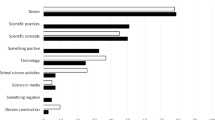Abstract
The current political and social backdrop in China that is characterized by rapid educational reforms to the K-12 education system, rapid growth in the number of science museum institutions, and Central Government policy which encourages collaboration between museums and school has the potential to be fertile ground for meaningful engagement between museums and schools. Notwithstanding, the Chinese K-12 education system generally does not utilize museum resources to support the curriculum, as is common in Western countries. This hermeneutic phenomenographic study elucidates the current Chinese views and perceptions among three stakeholders—school teachers, museum staffs and science educators—around this collaborative concept. The outcomes demonstrate that strongly entrenched cultural views and long-standing practices among stakeholder groups are obstacles to meaningful collaboration despite Central Government policy which encourages such engagement. The cultural values and perceptual views of stakeholder groups were discerned with the purpose of promoting mutual understandings and ultimately enabling meaningful collaboration in support of K-12 education in China.
Executive summary


Similar content being viewed by others
Notes
The term “interface” in this context refers to the shared boundary or interconnection between systems. It is the points at which independent systems or diverse groups interact.
References
Anderson, D. (1999). The development of science concepts emergent from science museum and post-visit activity experiences: Students’ construction of knowledge. Unpublished Doctor of Philosophy thesis, Queensland University of Technology, Brisbane, Australia.
Anderson, D., Kisiel, J., & Storksdieck, M. (2006). Understanding teachers’ perspectives on field trips: Discovering common ground in three countries. Curator, 49, 365–386.
Anderson, D., & Zhang, Z. (2003). Teacher perceptions of field trip planning and implementation. Visitor Studies Today, 6(3), 6–12.
CAST. (2006). The requirement on science museum enter school. http://www.cast.org.cn/n435777/n435794/n435820/n567165/36795.html.
CAST. (2007a). The law of the People’s Republic of China on popularization of science and technology. http://english.cast.org.cn/n1181872/n1182066/n1182093/46500.html.
CAST. (2007b). The current development of science and technology museums in China. http://english.cast.org.cn/n1181872/n1182063/n1182082/46508.html.
Denzin, N. K., & Lincoln, Y. S. (Eds.). (2000). Handbook of qualitative research (2nd ed.). Thousand Oaks, CA: Sage.
Falk, J. H. (2004). The director’s cut: Toward an improved understanding of learning from museums. Science Education, 88(S1), S83–S96. doi:10.1002/sce.20014.
Garro, L. C. (2000). Remembering what one knows and the construction of the past: A comparison of cultural consensus theory and cultural schema theory. Ethos (Berkeley, Calif.), 28, 275–319. doi:10.1525/eth.2000.28.3.275.
Griffin, J. (2004). Research on students and museums: Looking more closely at the students in school groups. Science Education, 88(S1), S59–S70. doi:10.1002/sce.20018.
Jamison, E. (1998). Field trip qualitative research. Prepared for: Science Museum of Minnesota and Minnesota Historical Society. Unpublished Research Report, Infocus Marketing Research, St Paul, MN.
Kang, C. (Ed.). (2004). Curriculum resources exploitation and utilization. Beijing: China Higher Education Press.
Kang, C. (2005). Strategies for research and development projects to address China’s educational reform. A presentation at an invitational conference on University, Schools and Government in Educational Reform: International Perspectives held in Beijing, China.
Kisiel, J. F. (2003). Revealing teacher agendas: An examination of teacher motivations and strategies for conducting museum field trips. Unpublished doctoral dissertation, University of Southern California, Los Angeles.
Kisiel, J. F. (2005). Understanding elementary teacher motivations for science fieldtrips. Science Education, 89, 936–955. doi:10.1002/sce.20085.
Laverty, S. M. (2003). Hermeneutic phenomenology and phenomenology: A comparison of historical and methodological considerations. International Journal of Qualitative Methods, 2(3), 1–29.
Michie, M. (1995). Evaluating teachers’ perceptions of programs at a field study centre. Science Teachers Association of the Northern Territory Journal, 15, 82–92.
Michie, M. (1998). Factors influencing secondary science teachers to organise and conduct field trips. Australian Science Teachers’ Journal, 44(4), 43–50.
Sewell, W. H. (1999). The concept(s) of culture. In V. E. Bonnell & L. Hunt (Eds.), Beyond the cultural turn: New directions in the study of society and culture (pp. 35–61). Berkeley, CA: University of California Press.
Storksdieck, M. (2006). Field trips in environmental education. Berlin, Germany: Berliner Wissenschafts-Verlag.
Strauss, A., & Corbin, J. (1998). Basics of qualitative research. Techniques and procedures for developing grounded theory (2nd ed.). Newbury Park: Sage.
van Manen, M. (1990). Researching lived experience: Human science for an action sensitive pedagogy. Abany, NY: State University of New York Press.
Wu, X. (2007). Museum learning: a new field of constructive study. A presentation at the 11th Academic Conference of Association of Chinese Psychology.
Acknowledgments
This research was made possible by a grant from the Beijing Natural Science Foundation (No. 9073017) and a special award from Canadian Studies (SACS). We also acknowledge the work of Li Li from China Science and Technology Museum, as well as other colleagues and graduate students at Beijing Normal University in their assistance with the study.
Author information
Authors and Affiliations
Corresponding author
Appendix
Appendix
Rights and permissions
About this article
Cite this article
Kang, C., Anderson, D. & Wu, X. Chinese perceptions of the interface between school and museum education. Cult Stud of Sci Educ 5, 665–684 (2010). https://doi.org/10.1007/s11422-009-9197-2
Received:
Accepted:
Published:
Issue Date:
DOI: https://doi.org/10.1007/s11422-009-9197-2




